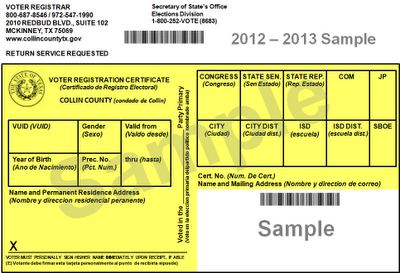 VOXXI - By Carlos Sanchez
VOXXI - By Carlos Sanchez
As the November elections draw closer, discourse about the Hispanic vote is surging. Whether this voting bloc, estimated to be worth as many as 12 million ballots cast nationwide, works may depend on voter outreach efforts — often a state-by-state and even region-by-region effort.
To understand the component of one of these outreach efforts. VOXXI talks to Rebecca Acuña, deputy political director for base outreach for the Texas Democratic Party about a program called the Promesa Project.
VOXXI: What is the Promesa Project?
Acuña: The Promesa Project is the Texas Democratic Party’s new approach to Hispanic outreach that’s based on two important findings: One, that today’s young Latinos are increasingly the trusted sources of political information in their families. And, two, that the Internet has surpassed television as the main source of political information for people under 30.
VOXXI: How will it work?
Acuña: The Promesa Project will use a combination of online and grassroots techniques to recruit young Latinos as the party’s messengers to their families and social networks. On PromesaProject.com, individuals will be able to give us their “promesa” that they will talk to their family and friends about voting Democratic. Through the website, they’ll have access to videos, talking points, and research to facilitate these conversations. The project also utilizes the party’s vast network of young, prominent Hispanic elected officials and party leaders by featuring them in our web videos and utilizing them as surrogates in their local areas.
VOXXI: If Latinos are the key to turning Texas blue, how long will that take? Is purple even on the horizon?
Acuña: There are 3.8 million eligible Latino voters in Texas, and one out of every four eligible voters in Texas is Latino. We know that on every issue that’s important to Latinos, Democrats are better.
The Promesa Project will increase turnout in the short-term by persuading low propensity Hispanic voters to turnout for Democrats and it will build the party in the long-term by engaging Latinos early.
VOXXI: What are the greatest concerns among Latinos in Texas?
Acuña: Latinos, like all Texans, are concerned about education and opportunity for future generations. Texas families are angry about the $5.4 billion in cuts Republicans made to public schools, which were made the first year Hispanic students accounted for more than 50 percent of students in Texas public schools.
Latinos deeply value a quality education, and know that a higher education opens the doors to opportunity. Sadly, these opportunities are being closed by Republicans who slashed financial aid for students. As a result of the Republican budget, 43,000 fewer Texas students will get state aid for college, including 29,000 fewer students getting a TEXAS Grant. Latinos, who represent half of all TEXAS Grant recipients, will be disproportionately affected.
Texas Democrats are the only ones talking about education and opportunity in Texas, and Texas Democrats strongly fought Republicans to keep them from making these cuts.
VOXXI: How do you respond to Republican criticism that President Barack Obama broke his promise to Latinos to reform immigration laws?
Acuña: Republican obstructionism is what prevented Congress from passing comprehensive immigration reform. Only three Republicans in Congress even supported the DREAM Act, which was originally written by a Republican. This was even after Democrats accepted Republican amendments in order to try and get the bill passed. If Republicans can’t even support the DREAM Act, which would let young students to earn a path to legalization if they go to college or join the military, there’s little chance Republicans would support broader comprehensive immigration.
The only way to make the DREAM Act a reality, or enact comprehensive immigration reform, is by electing more Democrats to Congress.
VOXXI: How do you explain the Obama administration’s aggressive deportation record?
Acuña: Republicans in Congress have obstructed any chance of comprehensive immigration reform, which is what our country needs.President Obama has enacted new policies on deportation which prioritizes deporting individuals with criminal records and calls for administrative review of all pending deportation cases. He also made administrative revisions to the three- and 10-year bans that will allow many immigrants to apply for legalization while remaining in this country. These are some of the most positive, sweeping changes we’ve seen in immigration policy in decades, and are the most the president can do without Congressional approval.
VOXXI: The first Hispanic governor of Texas: Latino or Latina?
Acuña: There are many talented, energetic Hispanic elected officials in Texas, Latinos and Latinas. One thing is for certain, the first Hispanic governor of Texas will be a Democrat.
Article from VOXXI - By Carlos Sanchez
For more about the Promesa Project - Click here and click here
The video below shows the 2012 Promesa Project Fellowship Inaugural class participants. They discuss the reasons they applied to become Fellows, offer their thoughts on the reasons why young people should get involved in politics and discuss the potential effects of this project.





